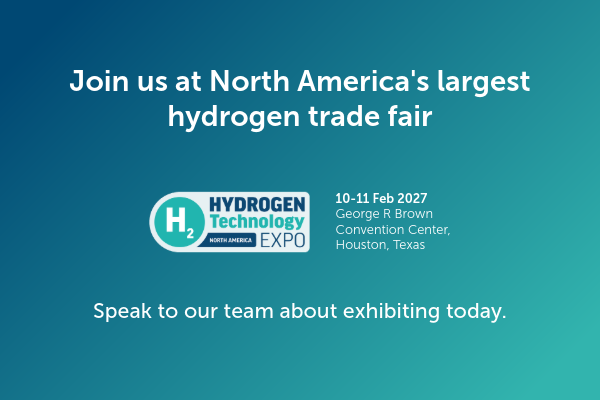-
Infrastructure and Integration
-
Strategic ForumDemand is the driving force behind the hydrogen economy—but turning potential into reality requires smart policy frameworks and targeted funding mechanisms. This session brings together leaders from a ...
-
Strategic ForumThis session will explore emerging carbon markets and Svante’s innovative approach to delivering carbon capture solutions for industrial decarbonization. We will begin with an overview of key trends a ...
-
Carbon Capture, Utilization & StorageThis presentation will focus on the benefits of an integrated solution whereby all aspects of the downstream carbon capture components including gas compression, conditioning and measurement are engin ...
-
Carbon Capture, Utilization & StorageThis presentation will showcase methods of control for temperature swing adsorption gas dehydration systems allowing for full loading of adsorbent media at various process conditions allowing for elon ...
-
Carbon Capture, Utilization & StorageThis presentation will discuss the use of microalgae technologies designed to convert CO2 into hydrocarbons, offering a sustainable approach to CO2 valorization. These technologies focus on producing ...
-
Carbon Capture, Utilization & StorageCentrifugal pumps used in CO₂ capture and transport are often burdened by design philosophies carried over from traditional oil & gas applications, resulting in unnecessary complexity and cost. This p ...
-
Mobility and Propulsion SystemsThis presentation will discuss the opportunities and challenges of SAF pathways. The session will focus on technological efficiency, economic profitability, and will discuss political and governmental ...
-
Infrastructure and IntegrationHydrogen is a versatile energy carrier that can be produced from various feedstock sources and can serve diverse applications in the transportation and industrial sectors. While the current cost of pr ...
-
Mobility and Propulsion SystemsAs the world strives to reduce greenhouse gas emissions, Sustainable Aviation Fuel (SAF) will continue to be a rapidly growing market. The aviation industry is challenged by limited supplies of tradit ...
-
Carbon Capture, Utilization & StorageClimate change concerns and significantly escalating demand for Low Carbon Power (LCP) to support growth of the Artificial Intelligence (AI) industry are pushing for deep decarbonization. The power ge ...
-
Mobility and Propulsion SystemsThe International Maritime Organization (IMO), which governs the regulations of international shipping, adopted a goal of achieving net-zero GHG emissions by 2050 at MEPC 80 in July 2023. This present ...
-
Mobility and Propulsion SystemsHydrogen is rapidly becoming essential for achieving zero-emission mobility globally. Applications include passenger cars, buses, trains, long-haul trucks, and heavy-duty equipment like cranes and for ...
-
Infrastructure and Integration
-
Carbon Capture, Utilization & Storage55,000 TPY pilot testing of MTR’s membrane-based post-combustion CO2 capture process. Membranes are a very compelling capture technology that have the benefits of no hazardous chemical use or emission ...
-
Carbon Capture, Utilization & StorageSupercritical CO₂ (ScCO₂) foam injection offers significant advancements in enhanced oil recovery techniques over traditional surfactant-alternating-gas (SAG) methods by utilizing its unique propertie ...
-
Carbon Capture, Utilization & StorageWe are faced with what this century could call one of the most important actions to be made to support centuries in the future… cooling the planet. Direct Air Capture (DAC) is a practical climate solu ...
-
Carbon Capture, Utilization & StorageThis presentation will discuss the of various types of CO2 compression technologies including integrally geared compressors, single shaft compressors, and reciprocating compressors. It will aim to hel ...
-
Fuels, chemicals, and concrete: Emerging CO2 utilization applications can accelerate CCUS deploymentCarbon Capture, Utilization & StorageCarbon dioxide utilization (CO2U) technologies have the potential to make CO2 capture economically viable even in the absence of carbon pricing and tax incentives, supporting the decarbonization of th ...
-
Carbon Capture, Utilization & StorageCarbon capture technologies have been in development for decades, yet inefficiencies and high costs continue to prevent widespread adoption. The carbon capture phase alone accounts for 45-90% of the t ...
-
Carbon Capture, Utilization & Storage
-
Carbon Capture, Utilization & StorageThe cement industry accounts for 8% of global CO2 emissions, highlighting the critical importance of Carbon Capture, Utilization & Storage (CCUS) in decarbonizing the sector. This panel will assess th ...
-
Carbon Capture, Utilization & StorageIndustrial-scale carbon capture and storage (CCS) is happening now - and success depends on more than just capture. Efficient transport and secure storage are essential to realizing decarbonization at ...
-
Carbon Capture, Utilization & StorageCarbon capture and storage (CCS) technology has been commercially proven for more than 50 years but it has yet to be widely adopted. Babcock & Wilcox (B&W) has extensively researched CCS technology ...
-
Carbon Capture, Utilization & Storage
-
Carbon Capture, Utilization & Storage
-
Carbon Capture, Utilization & StorageBy looking at the latest new projects being built, we will examine methods for improving operations and decreasing total project cost. Gas turbines use EGR to modify the combustion process resulting i ...
-
Carbon Capture, Utilization & Storage
-
Carbon Capture, Utilization & StorageCarbon Capture and Storage (CCS) is a pivotal technology in achieving net-zero emissions. This presentation discusses the importance of monitoring impurities such as sulfonated compounds, oxides of ni ...
-
Carbon Capture, Utilization & Storage
-
Carbon Capture, Utilization & StorageAccurate flow measurement is key in custody transfer applications. To ensure reliable measurement during energy transactions, it is necessary to incorporate state-of-the-art technologies into engineer ...
-
Carbon Capture, Utilization & StorageDeploying carbon capture, transport and storage (CCTS) requires introducing an extensive pipeline network to connect the value chain together and effectively decarbonize. There are many challenges to ...
-
Carbon Capture, Utilization & Storage
-
Carbon Capture, Utilization & StorageCarbon capture systems are essential for reducing emissions but are hindered by their high energy demands. Thermal Energy Storage (TES) offers a solution by storing heat from renewable energy or indus ...
-
Carbon Capture, Utilization & Storage
-
Carbon Capture, Utilization & StorageBiogenic CO2 emissions are originated as a result of the combustion of organic materials such as wood or other types of biomass. When biogenic CO2 emissions are captured and permanently stored, carbon ...
-
Carbon Capture, Utilization & StorageRecent breakthroughs in AI-driven research have significantly accelerated Carbon Capture and Utilization capabilities, delivering tangible gains in efficiency, cost, and speed. For example, the reduct ...
-
Carbon Capture, Utilization & StorageDeployment of a range of commercially viable carbon capture technologies is essential to reduce emissions from hard-to-abate industries. This can only be achieved if the technologies are both energy e ...
-
Carbon Capture, Utilization & Storage
-
Carbon Capture, Utilization & Storage
-
Carbon Capture, Utilization & Storage
-
Carbon Capture, Utilization & Storage
-
Carbon Capture, Utilization & Storage
-
Carbon Capture, Utilization & StorageAccording to the IEA, at least 650 megatons of anthropogenic CO2 is required to be stored every year by 2030 to meet emissions targets. CCS has the potential to be an effective method however has yet ...
-
Carbon Capture, Utilization & StorageCarbon dioxide capture in porous materials faces two challenges: adsorption temperature and the presence of water vapor. Direct air capture of CO2 benefits from both lower temperatures and low humidit ...
-
Carbon Capture, Utilization & StorageSupercritical CO2 (sCO2) injection has been performed as part of enhanced oil recovery (EOR) for decades. The materials of construction for the pipelines and wells (as casing and tubing) are predomina ...
-
Mobility and Propulsion SystemsIntroductionThis white paper presents three innovative solutions by Parker Hannifin to address the challenges of cathode air filtration in Hydrogen Fuel Cell Electric Vehicles (FCEVs). It details the ...
-
Mobility and Propulsion SystemsThe transition to hydrogen-powered heavy-duty and medium-duty trucks is gaining momentum, with both hydrogen internal combustion engines (H2 ICE) and hydrogen fuel cells (H2 FC) emerging as viable pow ...
-
Mobility and Propulsion SystemsSustainable Aviation Fuels (SAFs) offer the aviation industry the opportunity to decarbonize without significant engine modification and could contribute to net-zero. However, the present cost SAFs is ...
-
Mobility and Propulsion SystemsThis presentation provides comprehensive insights into the evolving hydrogen mobility landscape in Europe, with a specific focus on market development trajectories and infrastructure requirements for ...
-
Mobility and Propulsion SystemsLearn more about eSAF, how green hydrogen at scale plays an important role, and why it's important for the aviation industry.
-
Mobility and Propulsion SystemsHydrogen-based fuels are emerging as a key pathway for decarbonizing the maritime sector, with green hydrogen and derivatives like ammonia and methanol offering promising low-emission alternatives. Re ...
-
Mobility and Propulsion SystemsThe journey to net-zero emissions by 2050 will require a combination of solutions. Especially concerns about how shipping affects the environment, notably the release of greenhouse gases like carbon d ...
-
Mobility and Propulsion SystemsAs the global maritime sector intensifies its decarbonization efforts, hydrogen propulsion is emerging as a viable zero-emission alternative, aligning with ambitious international net-zero greenhouse ...
-
Mobility and Propulsion SystemsDecarbonisation is both a challenge and an opportunity for the maritime sector. This presentation on The Maritime Energy Transition highlights the urgent need for decarbonization in the shipping indus ...
-
Mobility and Propulsion SystemsHydrogen as an energy carrier is becoming more promising for the mining industry as an alternative decarbonization solution moving away from fossil fuel-based applications. Fossil fuel-based energy so ...
-
Mobility and Propulsion SystemsSeveral heavy-duty manufacturers like Freightliner, Paccar, JCB, and Volvo are turning to hydrogen to fuel their next generation vehicles. Whether using an ICE or FCEV both need to store hydrogen on- ...
-
Mobility and Propulsion SystemsHydrogen internal combustion engines (H2ICE) propose an alternative way to decarbonize heavy-duty vehicles, in opposition to the increasingly popular electric vehicles, with sales expected to grow in ...
-
Mobility and Propulsion Systems
-
Mobility and Propulsion Systems
-
Mobility and Propulsion SystemsAttendees will learn about the current landscape of the fuel cell electric vehicle market and the following topics will be covered:1. The Upside Potential: The presentation would underline the overall ...
-
Mobility and Propulsion SystemsSolid Oxide Fuel Cells (SOFCs) are promising technology for mobility applications, offering high efficiency, fuel flexibility, and low emissions. This presentation explores the potential of SOFC tech ...
-
Mobility and Propulsion Systems
-
Mobility and Propulsion Systems
-
Mobility and Propulsion Systems
-
Mobility and Propulsion Systems
-
Mobility and Propulsion Systems
-
Mobility and Propulsion SystemsThe presentation highlights a newly established hydrogen ecosystem in Savannah, Georgia, which supports 21 fuel cell electric Class 8 trucks used for Hyundai’s plant logistics. This ecosystem includes ...
-
Mobility and Propulsion Systems
-
Mobility and Propulsion Systems
-
Mobility and Propulsion Systems
-
Mobility and Propulsion Systems
-
Mobility and Propulsion Systems
-
Infrastructure and IntegrationThe MISTRAS Engineering Services Group (MISTRAS) was engaged by Wacker Polysilicon North America LLC (Wacker) to perform failure analysis of a 4-inch stainless-steel pipe that leaked in hydrogen servi ...
-
Infrastructure and IntegrationIn this presentation, we will introduce an innovative and crucial membrane separation technology that contributes to the realization of a sustainable hydrogen society. The establishment of a supply ch ...
-
Infrastructure and IntegrationAs the hydrogen economy accelerates, large-scale electrolyzers stand at the forefront of sustainable energy production. Yet the inherent hazards of handling hydrogen and oxygen, combined with rapidly ...
-
Infrastructure and IntegrationPort Houston’s roles in expanding the Houston Ship Channel and driving economic development and prosperity in the region relate directly to the Hydrogen industry by encouraging energy exports, and hel ...
-
Infrastructure and IntegrationHydrogen is an essential fuel source for a zero-carbon future. It is energy-dense, capable of long-term storage, and emits only water vapor when generating electricity within a fuel cell. The United S ...
-
Infrastructure and IntegrationAs companies building hydrogen systems prepare to move from demonstrator and early adopters to standardized production, new challenges arise related to scaling production. With tight labor markets, li ...
-
Infrastructure and Integration
-
Infrastructure and Integration
-
Infrastructure and IntegrationSalt caverns are a viable option for hydrogen storage, they can store large volumes of hydrogen to be delivered when required. However, finding a suitable location and creating a storage cavern has nu ...
-
Infrastructure and Integration
-
Infrastructure and IntegrationThe demand for hydrogen hasn’t scaled as quickly as once thought, however equipment suppliers along the value chain depend on market growth. This presentation will focus on the production automation e ...
-
Infrastructure and Integration
-
Infrastructure and IntegrationMeasurement of Hydrogen purity is a growing concern as more and more production methods of hydrogen are scaled. Realtime purity can be derived using optical analyzers, but there are a lot of details t ...
-
Infrastructure and IntegrationNFPA 2 is a continuously evolving standard for hydrogen generation and use facilities. This workshop provides a high-level overview of the 2023 version. The purpose of the workshop is to provide a cle ...
-
Infrastructure and IntegrationElectrolyzers, while primarily designed to produce high-purity hydrogen, also generate oxygen by splitting water into hydrogen and oxygen. Due to oxygen's highly reactive nature, special precautions a ...
-
Infrastructure and IntegrationLakeside Process Controls has been involved in multiple hydrogen blend projects and consultations into pipelines and combustion appliances such as boilers. Through this work we have developed best pra ...
-
Infrastructure and Integration
-
Infrastructure and Integration
-
Infrastructure and IntegrationHydrogen distribution currently contributes more to the final delivered cost than hydrogen production does, making it impossible for clean hydrogen to compete with diesel in demanding applications lik ...
-
Infrastructure and Integration
-
Infrastructure and Integration
-
Infrastructure and Integration
-
Infrastructure and Integration
-
Infrastructure and Integration
-
Infrastructure and Integration
-
Infrastructure and Integration
-
Infrastructure and IntegrationThe energy transition depends on three critical pillars. First, better efficiency is needed, as the world wastes over 65% of the energy produced, converted, and consumed. Second, we need reliable and ...
-
Infrastructure and Integration
-
Infrastructure and IntegrationAs the global hydrogen economy gains momentum, infrastructure remains a critical bottleneck. This presentation will explore how electrically enabled Liquid Organic Hydrogen Carrier (LOHC) technology b ...
-
Infrastructure and Integration
-
Mobility and Propulsion SystemsSyzygy Plasmonics has successfully completed performance testing of the world's largest all-electric GHG e-Reforming™ demonstration unit in Houston. After over 3000 hours of rigorous trials in Houston ...
-
Hydrogen & Alternative Fuel ProductionDecarbonizing hard-to-abate industries, such as maritime shipping, power generation, and heavy industry, remains a major challenge due to their reliance on fossil fuels and the required scale. While e ...
-
Hydrogen & Alternative Fuel ProductionAs the demand for clean hydrogen accelerates, transportation and logistical and cost challenges remain key barriers to widespread adoption. Modern Hydrogen’s innovative natural gas pyrolysis technolog ...
-
Hydrogen & Alternative Fuel ProductionThe potential for global natural hydrogen production from the serpentinization of iron-rich ultramafic rocks is of the order of 1010 moles. With support from ARPA-E the project team seeks to enhance, ...
-
Hydrogen & Alternative Fuel ProductionOvercoming incumbent challenges and increasing efficiencies along the value chain is a core aspect of driving the scalability and success of electrolytic hydrogen production projects. The presentation ...
-
Hydrogen & Alternative Fuel ProductionCelanese has been using Carbon Capture and Utilization at commercial scale to produce chemistries for various end markets since the start of 2024. Nearly 400 Million Pounds per year of CO2 emissions, ...
-
Hydrogen & Alternative Fuel ProductionRevolutionizing Hydrogen Production: Preliminary Results from the World’s First Non-Electrically Heated Methane Pyrolysis PlantAs global demand for clean hydrogen accelerates, innovative production me ...
-
Hydrogen & Alternative Fuel ProductionThe presentation will provide details of a chemical looping, hydrogen commercial demonstration project aimed at unlocking pathways to energy diversification. We will discuss scalability and future ex ...
-
Hydrogen & Alternative Fuel Production
-
Hydrogen & Alternative Fuel Production
-
Hydrogen & Alternative Fuel Production
-
Hydrogen & Alternative Fuel Production
-
Hydrogen & Alternative Fuel Production
-
Hydrogen & Alternative Fuel Production
-
Hydrogen & Alternative Fuel ProductionThe production of electrolysis-based hydrogen faces significant challenges, including scale and cost. Reducing the levelized cost of hydrogen requires a multi-faceted approach: lowering the cost of el ...
-
Hydrogen & Alternative Fuel Production
-
Hydrogen & Alternative Fuel ProductionLarge scale, integrated hydrogen plants represent the next logical step in water electrolysis to decarbonize large industries currently dependent on fossil based hydrogen. Electric Hydrogen will prese ...
-
Hydrogen & Alternative Fuel Production
-
Hydrogen & Alternative Fuel ProductionAmmonia is set to play an increasingly large role in the energy transition, from hydrogen transportation to energy storage, shipping and fertilizers. Production today produces high emissions, however ...
-
Hydrogen & Alternative Fuel ProductionTo achieve the lowest carbon intensity, green hydrogen production must be closely matched to new renewable power sources. This presentation delves into the intricate relationship between electrolyzers ...
-
Hydrogen & Alternative Fuel ProductionThe presentation explores the potential of integrating a compact carbon capture and utilization (CCU) technology with green methanol technology in a Kraft process plant. We employed electrolyzer vendo ...
-
Hydrogen & Alternative Fuel ProductionOptimizing Hybrid Green and Blue Hydrogen with Ammonia Production:Tailoring flow-schemes for scalable, cost-effective, and flexible hydrogen and ammonia production across various project sizes and mar ...
-
Hydrogen & Alternative Fuel ProductionMany advanced CCS technology has been developed by technology provider and they have been demonstrated in Power production sector, Cement industry, and some in other various industries.Despite recent ...
-
Hydrogen & Alternative Fuel Production
-
Hydrogen & Alternative Fuel Production
-
Hydrogen & Alternative Fuel Production
-
Hydrogen & Alternative Fuel ProductionAs the world pushes forward with incentives for green hydrogen and related derivatives, we see typical concept-design-build timelines shrinking. At the same time, electrolysis is a developing technolo ...
-
Hydrogen & Alternative Fuel Production
-
Hydrogen & Alternative Fuel Production
-
Hydrogen & Alternative Fuel Production
-
Hydrogen & Alternative Fuel ProductionGeologic hydrogen could be a major asset in our effort to decarbonize. It can either be found as pre-existing accumulations or generated given the correct geological conditions. Exploration into its p ...
-
Hydrogen & Alternative Fuel ProductionExploring the Levelized Cost of Hydrogen (LCOH) is crucial for evaluating the economic viability of hydrogen projects utilizing PEM electrolyzers. This presentation examines the key factors influencin ...
-
Hydrogen & Alternative Fuel ProductionBlue hydrogen is currently viewed as a bridging method between reliance on fossil fuels and the advancement of green hydrogen production techniques, receiving a lot of attention and funding worldwide. ...
-
Hydrogen & Alternative Fuel ProductionHydrogen is the fuel of the future, and as a carrier of clean renewable energy, it will be essential to meeting global goals to decarbonize the economy—but most hydrogen produced today is powered by f ...
-
Hydrogen & Alternative Fuel ProductionThe development of off-grid ALK hydrogen production technologiesThe major obstacle to increase the application of green hydrogen to reduce CO2 is the cost. ALK electrolyzer has the potential to produc ...
-
Strategic ForumThis discussion will provide an update on the state of hydrogen policies under the new Trump Administration and Congress. This will discuss the state of clean energy incentives, grant programs and ini ...
-
Strategic Forum
-
Strategic ForumPermitting a carbon capture project involves unique and challenging regulatory considerations which can take significant time and money to address. For example, assessing air permit applicability requ ...
-
Strategic Forum
-
Strategic ForumThis panel will explore critical considerations for scaling hydrogen projects in today’s dynamic energy landscape, focusing on managing technology risks, controlling costs, and avoiding delays in achi ...
-
Strategic Forum
-
Strategic Forum
-
Strategic Forum
-
Strategic ForumNext generation AI will require enormous amounts of low carbon firm power within a short time frame. This presentation will cover the opportunity for CCUS as an enabler of US leadership in AI, the mar ...
-
Strategic Forum
-
Strategic Forum
-
Strategic Forum
-
Strategic Forum
-
Strategic Forum
-
Strategic ForumSuccessfully deploying carbon removal projects hinges on more than just technological innovation. It requires earning and maintaining a social license to operate. Without local support and acceptance, ...
-
Strategic ForumCCS Permitting geologic carbon storage sites is a long process. In the US it may take years to get permission to construct an injection well and additional time after construction to be authorized to ...
-
Strategic Forum
-
Strategic ForumGreen hydrogen production is a growing field with multiple producers working towards going from the design drawing board to a physical production plant.To make this dream become a reality, one must tr ...
-
Advancing Hydrogen, CCU, and CCS Investments in Saudi Arabia: RCJY’s Vision for a Sustainable FutureStrategic ForumSaudi Arabia is developing a leading hydrogen economy through Green Hydrogen, Carbon Capture Utilization (CCU), and Carbon Capture & Storage (CCS). The Royal Commission for Jubail and Yanbu (RCJY) is ...
-
Strategic Forum
-
Strategic Forum
-
Strategic Forum
-
Strategic ForumThis panel will assess how CCUS projects can establish methodologies for engineering due diligence and understand how to mitigate risks prior to investment opportunities, which can be applied to a var ...
-
Strategic ForumDeep dive into the economics of hydrogen projects. Discover how technology, strategic power sourcing, and enabling infrastructure are driving project development. Learn about the critical role of end- ...
-
Strategic ForumThe rise of AI in recent years has huge potential when applied to our power grids, especially as hydrogen enters the energy mix. However, this also poses potential risks when energy security is consid ...
-
Strategic Forum
-
Infrastructure and IntegrationIntroductionCritical raw materials (CRMs) are vital to modern society because they are essential components in the production of a wide range of technologies and infrastructure. Platinum Group Metals ...
-
Strategic ForumEurope is experiencing a wave of green hydrogen project cancellations, highlighting the financial strain of early adoption. Major projects like HH2E in Germany have filed for insolvency, citing the hi ...
-
Infrastructure and IntegrationGlobal hydrogen demand is projected to increase by 7% annually, with transportation expected to account for 4% of the total share by 2030. Within this segment, light-duty fuel cell electric vehicles ( ...
-
Strategic ForumIn this session, panellists will provide a retrospective look at carbon markets in 2024 and the beginning of 2025 and how they have influenced decarbonization. Speakers will discuss a regional and glo ...
-
Strategic Forum
-
Strategic Forum
-
Carbon Capture, Utilization & StorageIn 2024, only 1/3rd of the announced global carbon capture, transport and storage clusters show CO2 sources and sinks are integrated. By the end of 2023, the number of cancelled CCS projects were repo ...
-
Mobility and Propulsion SystemsAVL addresses the growing demand for low CO2 mobility solutions with a comprehensive simulation and testing portfolio tailored for the fuel cell market. In recent years, physics-based simulation model ...
-
Strategic ForumLarge-scale CCUS projects are now a necessity to decarbonize, attracting capital investment and emerging policy and regulatory incentives such as the 45Q under the 2022 Inflation Reduction Act and Can ...
-
Strategic ForumThe main challenges facing CCUS today are linked to supply chain, which can be summarized into four key areas: (1) pipeline and transportation, (2) duration of permitting and safety concerns, (3) CAPE ...
-
Strategic ForumAmbitious climate targets are propelling the CCUS industry forward, now supported by policy incentives and private capital investments. However projects are often hampered by high costs. This panel wi ...
-
Infrastructure and IntegrationThe success of commercial hydrogen production systems equally depends on product gas storage and filling for transport as it does on the process technology, regardless of the feedstock source or produ ...
February 10 - 11 2027
George R Brown Convention Center, Houston, Texas, USA



















































































































































































)
)
)
)
)
)
)
)


)
)
)
)
)
)
)
)
)
)
)

)
)
)
)
)
)
)
)
)

)
)
)
)
)
)
)

)
)
)
)
)

)
)

)
)
)
)
)
)
)
)

)
)
)
)
)
)
)

)
)

)
)
)
)
)
)
)
)


)
)

